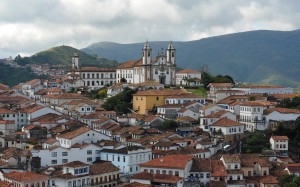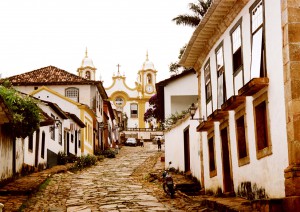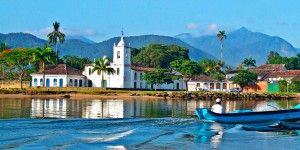Historical Cities in Brazil Posted by carol on Oct 2, 2015 in Brazilian Profile, Culture, Geography
If compared to European countries, Brazil is relatively jovem (young), being only a little over 500 years old. No entanto, (nevertheless), there are a great deal of cidades históricas (historical cities) like Ouro Preto, Tiradentes, Paraty, Olinda, Porto Seguro, Salvador among others that are part of our cultural heritage and stand as tributes to nosso passado e memória (our past and memory).
These cities have stood the test of time and bravely resisted the temptation of modern urban development and its comforts. Some have been elected by Unesco as World Heritage sites, because of their significance as historical patrimonies.
The feeling de voltar no tempo (of going back in time) when visiting those places can be partly due to their predominantly baroque architecture, a lavish and opulent style that had its roots in Italy, though it extended to other countries and acquired its own characteristics. This kind of aesthetics has a strong touristic appeal and attract travelers do mundo inteiro (from all over the world).
For this post, I have selected three major cities of high historical value and representative of our cultural legacy that can be of special interest to visitors and those who are interested in learning more about Brazil.
Ouro Preto
Located in the southeastern state of Minas Gerais, Ouro Preto (Black Gold) is strongly associated with the Brazilian gold rush. Its name derives from the peculiar aspect of the mineral in the area, of slightly darker shade than regular gold. Its history dates back from the 18th século (century). After a descoberta (discovery) of gold deposits by the Bandeirantes – a kind of explorers – major gold rushes took place, leading to permanent settlement na região (on the region).
Back when Ouro Preto was still a colony from Portugal, the city was appropriately named Vila Rica (Rich Village) and it used to be the former capital of the state. It is about 100 km (60 miles) from the now state capital, Belo Horizonte.
Among its many landmarks, such as the monumental Praça da Tiradentes, Ouro Preto has a large number of igrejas (churches) – some of which have been decorated with ouro (gold), fountains, chapels and museums that display religious art. It is a college town for the Universidade Federal de Ouro Preto (Federal University of Ouro Preto) and many of its moradores (residents) are students who live in Repúblicas, a type of fraternity house. The city is famous for the traditional carnival festivities celebrated across its streets that last for days, when Ouro Preto suddenly finds itself dealing with an even more intense intense influx of visitors. The Festival de Inverno (Winter Festival) in July is also uma boa oportunidade (a good opportunity) to get to know the city.
Tiradentes
Localizada (Located) in Minas Gerais as well, Tiradentes is also a major tourist destination. As small as it is charmosa (charming), the city was named after the national martyr. It pays tribute to the hero who led the movimento revolucionário (revolutionary movement) that strived for independence from Portugal’s colonial rule.
Tiradentes is noted for a number of events it holds ao longo do ano (throughout the year). The most important ones are the Festival de Gastronomia (Gastronomy Festival) in August, where chefs from abroad come to delight the tourists with the best dishes from the international cuisine as well as to provar (taste) the year-round comida mineira (mineira food). There is also the Festival de Cinema (Film Festival) in January. Attended by several prominent movie directors and focusing entirely on national productions, the event features workshops, debate and atrações musicais) musical attractions. Another highlight is the Maria-Fumaça (Mary Smoke), a still operating steam locomotive that makes viagens diárias (daily trips) from the station in Tiradentes to the also historical city of São João Del Rey, a 12 km journey (7 miles).
Besides the casas históricas (historical houses) and churches that compose its cenário (scenery), Tiradentes is also surrounded by montanhas (mountains), the imposing and striking Serra de São José. Para aqueles que gostam de natureza (For those who are into nature), caves, waterfalls, trekking tours and parks are part of its attractions.
Paraty
Possibly one of lugares mais deslumbrantes do Brasil (Brazil’s most stunning places), Paraty is a prime touristic destination in the state of Rio de Janeiro. Its name is originalliy in Tupi, an indigenous language, and it means Rio de Peixe (River of Fish). Its beauty lies not only in its well-preserved colonial architecture, but also in the geographical space where it is situated: a region that assembles o litoral (the coast), the mountains and is surrounded by florestas e ilhas tropicais (tropical forests and islands).
Founded in the 16th century, the city also has a relation with the previously mentioned gold rush, and it was part of the so-called “gold trail”, uma estrada (a road) connecting Minas Gerais to Rio Janeiro that was used to transport gold and other goods – even slaves – before they were shipped overseas.
The historical center is home to many cafés, bars, restaurants and shops, and no motorized vehicles are allowed, which makes it easier for tourists to walk freely down the cobblestone-paved streets. Depois de aproveitar (After enjoying) the history and culture of the historical center, one can focus on the belezas naturais (natural beauties) the city has to offer.
The village of Trindade is 30 km (18 miles) away from Paraty. It used to be a fisherman’s village, but it was discovered by the hippies in the 70s and later ocuppied by adventurers and surfers. Now it has become a touristic spot with many awe-inspiring praias (beaches).
The Festival Literário de Paraty- FLIP (International Literary Festival of Paraty) is also a major event that takes place in the city every July and has the presence of world-renowned authors discussing literature and their works, as well as musical events and lectures that draw a great number of students and intellectuals from Brazil and the resto do mundo (rest of the world).
Vocês já visitaram esses lugares? (Have you visited these places?) Vale a pena! (It’s worth it!)
Tenha um ótimo fim de semana (Have a great weekend)

Build vocabulary, practice pronunciation, and more with Transparent Language Online. Available anytime, anywhere, on any device.







Comments:
halla:
Adoro Brasil!!!!!!!!!!!!!
Angie:
I ♥ brasil! I hope I can visit that amazing place
Angie:
I love brasil so much! thanks for sharing